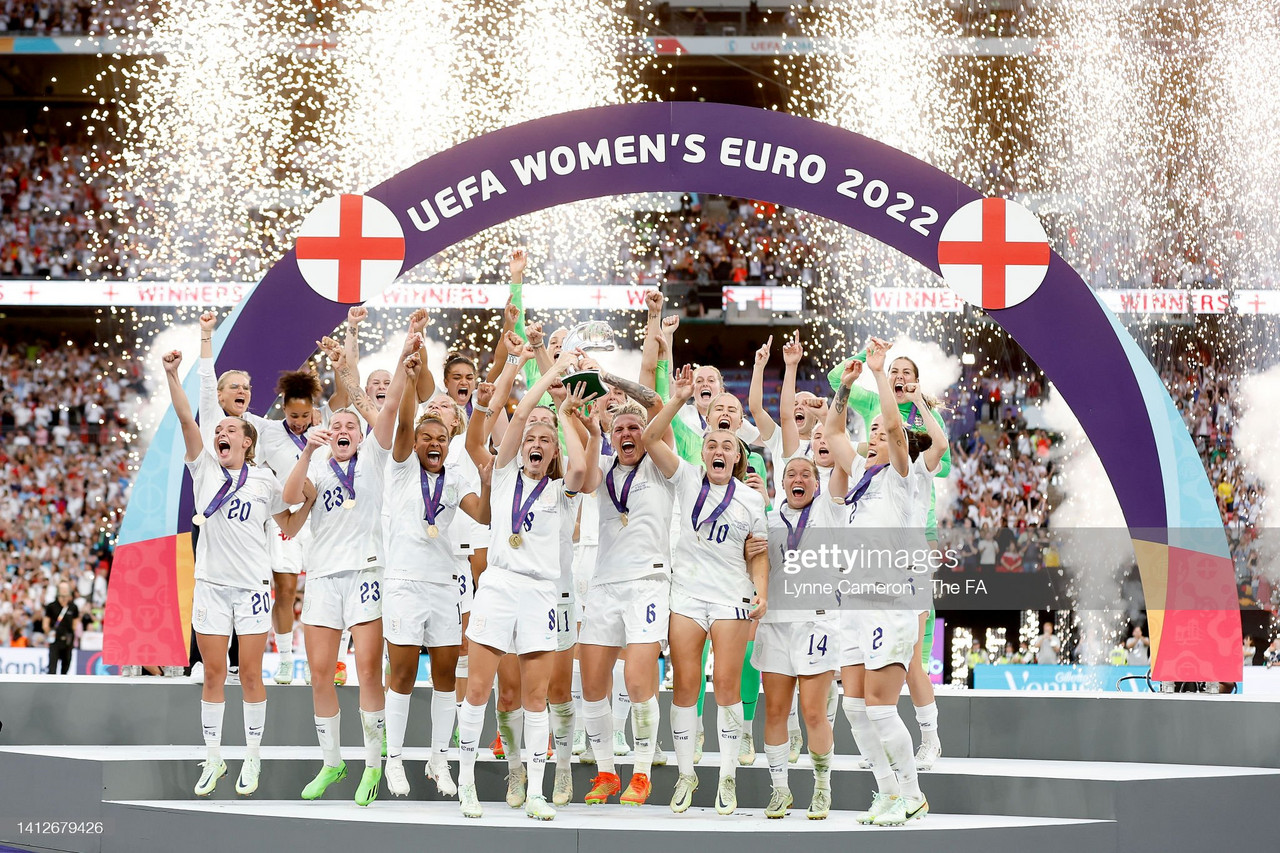Before 2022, the first and last time England had won a major international tournament was in 1966, when Sir Alf Ramsay led his men to a coveted Jules Rimet trophy.
The victory over West Germany in the final upheld the revelry that Britain was the envy of the world. The nation was thrust into a post-war boom that called for a decade of fever, excitement and betterment.
But while the countryman could exercise his new entitlements at no extra cost, women were still lunging towards the out-of-reach fulfilment of political, social and economic emancipation.
In the same year the men lifted the World Cup, women in Britain were still fighting for equal pay; abortion was illegal, and the idea of antidiscrimination and equal opportunities was a mere fantasy.
However, now in 2022 - after five decades of soliciting men to bring football home again - it is the women who did it.
The success of England's lionesses in the European Championships has already encouraged a groundbreaking change in the women's game, stimulating the popularity of the sport to witness rapid growth.
2022 was a historic year and promises to be the start of many.
-
The love of football - The Lioness way
For outsiders, England is the home of hooliganism. The spiritual breeding ground for the idiot abroad. For decades, foreign countries have feared hosting international tournaments in the presupposition that heedless Brits will unleash havoc.
In the men's European Championship final, all those stereotypes were personified by a horde of firework-wielding, piss-throwing, intoxicated Englishmen around the capital on July 11th 2021. The mutiny had hit home, and the love for football had been thrown out of the window.
Indeed, it's only fair to state that it was a minority that caused the problems, but with neither the result nor the reputation of England going in their favour, the 2020 self-hosted Euros was left with a black cloud hanging over it.
Just a year and 20 days later, though, The Lionesses brought fever pitch to Wembley Stadium.
In complete contrast to the men's final - before a ball was kicked, there was a different sentiment to the women's version. A country united and back in love with football played centre stage in a sporting fixture that, at long last, changed the course of women's football.
But whereas goals from Ella Toone and Chloe Kelly stuck a dagger into England's 50+ years of hurt after 110 nail-biting minutes of football, which brought about the momentous headlines of football coming home, the gravity of the triumph outweighs more than just the grandeur of a trophy that twinkled in the midsummer sun.
To mark the event, London and the rest of England transformed into an inclusive, all-welcoming celebration that gave The Lionesses their big moment. Regardless of the result, they were already designated heroes by each pair of eyes that watched them.
From touring the nation during their Euro qualifying campaign in front of under 10,000 fans at grounds such as Adams Park, Meadow Lane and Rotherham's New York City Stadium to breaking the all-time Euros attendance with 87,192 spectators five years later, The Lionesses are now figures in English culture who are treated like royalty.
So it is no surprise that the cultivation of the love for football they have forged and their trophy-laden success has been rewarded with places in the King's New Year's Honours list.
Lioness manager Sarina Weigman has been awarded an honorary CBE, captain Leah Williamson with an OBE, while Beth Mead, Lucy Bronze, Ellen White, Jen Beattie, and Kim Little were all given an MBE for their services and outstanding commitment to association football.
Although not every member of the ferocious 2022 Lioness pride was rewarded with royal recognition, every single one of them played a hand in becoming the quintessence of the love that encircles their sport.
-
Progress for the women's game in numbers
The success of the 2022 England Lionesses captured the zeal and excitement of football in the country. By sharing their experience and winning spirit on live television, that same sentiment has travelled to countries across the globe.
However, it is in their homeland that the positive attitude towards participation in the women's game can be seen most widely prevailing.
After winning the UEFA Women's EURO 2022 and the inaugural Arnold Clark Cup, awareness of England's senior women's team is up 32% since June 2022 in girls aged between 5-16.
As the Lionesses strived through an unbeaten and record-breaking year on pitches around the country, they became role models for those watching in the stands.
They broke eight attendance records in the competition. 574,875 people watched the tournament - double EURO 2017's figures; a peak TV audience of 17.4m watched the final on BBC, while it boasted a 365m global viewership across 195 territories.
Attendances have also soared in the domestic leagues, as the Barclays Women's Super League (WSL) announced an astounding 227% increase in ticket sales from last season, while the Women's Championship has profited by an 86% spike.
Between them, both divisions smashed single-game attendance records, while half of all clubs have broken an individual club and/or stadium record so far this season as well.
The WSL is now proudly the most-followed women's professional football league in the world, with over 1.55m followers across social channels.
In turn, the participation from the stands has made its way onto the pitch, with over 416,000 new opportunities to play, coach, officiate and volunteer created in England across schools, clubs, and the community across the nine host cities of the European Championships.
Furthermore, the FA recorded a 196% increase in women’s and girls’ football session bookings through the England Football ‘FindFootball’ tool.
150,000 girls are now registered to take part in next year’s Let Girls Play ‘Biggest Ever Football Session’ on International Women’s Day (8 March), supporting the Barclays Girls’ Football School Partnerships by England Football and the ambition for girls to have equal access.
-
More than just a game
Bill Shankly was one of the first pioneers of the notion that football's importance extends far beyond just the realms of the game, suggesting that, "it is a matter of life and death".
Such occasions that prove just this include the Christmas truce when a series of widespread unofficial ceasefires along the Western Front during WWI led to football games between the English and the Germans.
Although the Lioness' European triumph may not be as critical to world peace as that surreal timeline of events in 1914, you have to feel it's an inspiring moment in football that shows it is a larger-than-life sport.
Quite simply, football is more than just a game. It evokes unity, love, and friendship in times of difficulty. In 2022, football conquered above all as the crux of women's progress.
"This hasn't been a change for women's football, but society in general. This is not the end of a journey, but the start of one" - Leah Williamson, England Lioness captain 2022.









































